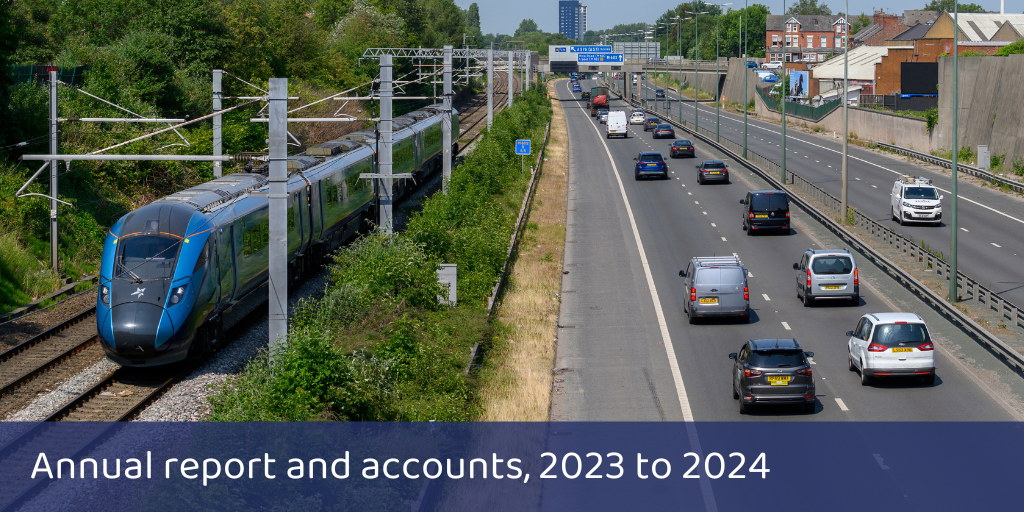
- Report presented to Parliament pursuant to section 74(1) of the Railways Act 1993
- Accounts presented to the House of Commons pursuant to section 6 of the Government Resources and Accounts Act 2000.
- Accounts presented to the House of Lords by Command of His Majesty
- Ordered by the House of Commons to be printed on 24 July 2024
Preface
About this annual report and accounts
This document integrates performance and financial data to help readers gain a better understanding of the work of the Office of Rail and Road (ORR).
It covers the activities of ORR from 1 April 2023 to 31 March 2024 and is split into three main sections:
The performance report includes a summary of progress achieved in 2023-24 in delivering our strategic objectives and service standards (the performance overview), followed by a fuller review of delivery of our strategic objectives (the performance analysis).
The accountability report is split into three sub-sections and includes:
- A corporate governance report, which includes the directors’ report, the statement of Accounting Officer’s responsibilities and a governance statement;
- A remuneration and staff report, which includes pay and benefits received by executive and non-executive board members and details of staff numbers and cost; and
- A parliamentary accountability and audit report, which allows readers to understand ORR’s expenditure against the money provided to it by Parliament by examining the statement of outturn against Parliamentary Supply and includes a copy of the audit certificate and report made to Parliament by the head of the National Audit Office, setting out his opinion on the financial statements.
The financial statements show ORR’s income and expenditure for the financial year, the financial position of ORR as of 31 March 2024, and additional information designed to enable readers to understand these results.
Chief executive’s report

ORR’s role is to protect the interests of current and future rail and road users. 2023-24 has been another busy year across ORR’s broad and diverse functions.
We continued to press Network Rail to improve train performance. By late autumn, while there were modest improvements on most parts of the network, performance in the Wales and Western region had failed to stabilise. We launched an investigation into whether the region was doing everything reasonably practicable to address the issue, concluding that this was not the case in July 2024. We required Network Rail to produce a robust plan by 31 August 2024 to remedy this, with a £3m fine to be paid if the plan fails to meet the requirements we set.
Following breaches of health and safety law, we concluded several prosecutions, with significant fines for Network Rail for the Carmont derailment and for Transport for London and Tram Operations Limited in respect of the Croydon Tram crash, both tragic incidents with fatalities.
We completed our 2023 periodic review, determining Network Rail’s regulatory settlement for the next five-year control period separately for England & Wales and for Scotland. Among other things, this involved close scrutiny of whether the company could manage key safety risks, while also challenging it to deliver more for the significant taxpayer funding it was allocated, including more ambitious performance targets. Our focus is now on ensuring that Network Rail delivers on these commitments for passengers and freight users.
An important aspect of ORR’s work is driving efficiency on the networks it regulates. I am pleased to report that Network Rail exceeded its efficiency target for both the year and the 2019-24 control period overall, delivering around £1.1bn and £4bn of efficiencies respectively. This is a major achievement for the company, but it is also important to recognise ORR’s sustained scrutiny of this – reflecting the need to secure value for money for the taxpayer.
Our work to secure a better deal for passengers saw us, for example, intervene with third party ticket retailers to stop the practice of ‘drip pricing’. This is where customers are initially given a lower price on a website, only to see the full costs become apparent at the end of the purchase process.
We also carried out a market study of the station catering market, where our provisional findings were that the market was not working as effectively as it should be and that passengers and taxpayers would benefit from greater competition. Our final report setting out our recommendations was issued in June 2024.
We continued to press for a better service for passengers who need support when travelling, building on important improvements in recent years. This included our first review of lift availability and the passenger information on this. We have since launched a review into whether Network Rail is taking appropriate steps to plan and carry out repairs to lifts. Following an audit, we also set out areas for improvement into how rail operators provide passenger assistance and are following up with the industry on this.
On roads, National Highways met a number of its annual performance targets in a year when there were delays in government decisions and a reduction in funding. However, we had wider concerns about its capability underpinning its performance and delivery. This led us to carry out a formal investigation of the company. This culminated in our Board finding in June 2024 that National Highways was non‑compliant with its licence in respect of the provision of data and information to allow us to perform our statutory duties, protect the interests of road users, and ensure the efficient spend of public money. We will work with the company as it produces a plan on how to address this.
Alongside our work on the 2024 periodic review of High Speed 1 (HS1), we reported on HS1 missing some of its targets and needing to do more to tackle this.
On corporate matters, we relocated our Glasgow office to a new long-term base, providing better facilities to support our staff in carrying out their duties. We also carried out significant work to improve our cyber security culture, including aligning with the Government Cyber Security Strategy.
This is a brief snapshot of the year, and inevitably does not cover a lot of the important day-to-day work we do which the rail industry relies on. This includes our work to authorise rail infrastructure and vehicles, our publication of official statistics and our approval of access agreements. The rest of this report covers all such areas more fully.
On a personal note, I would like to pay tribute to Ian Prosser for his work as HM Chief Inspector for nearly 16 years. The much improved safety record of the rail industry over his time as Chief Inspector owes much to Ian’s focus and dedication, and I wish him well for his retirement.
And more broadly, I would like to thank all ORR colleagues for their professionalism and dedication in delivering ORR’s work over the year.
John Larkinson, chief executive and accounting officer
Chair’s report

The importance of our rail and road networks in supporting growth and enabling people to connect with each other remains as vital as ever.
Yet the wider backdrop remains challenging. Inflation in the last year has again brought higher than anticipated costs for industry. Rail travel has broadly recovered since the pandemic, but industry revenues are lower as proportionately more people travel for leisure. Climate change continues to have an impact – particularly on the rail industry, which was especially affected by the winter’s storms. And rail performance remains a concern for many passengers and freight operators.
In this environment, it is particularly important for ORR to make the right proactive judgements and interventions, in the public interest, not least to protect users and make the most of the limited funding available.
Our work on the 2023 periodic review of Network Rail is a good example of us playing exactly this sort of role, with difficult calls and trade-offs to make on a number of complex issues. These included: how to manage the impact of high inflation on the funding allocated by the governments; whether Network Rail’s approach to asset management could deliver a safe railway; and the balance between being challenging on the performance targets we set while being realistic about what can be achieved.
ORR also stepped in a number of times to protect the interests of users, leading to fairer on-line ticketing, and improvements in Network Rail’s plans for freight and performance. We have also had to take more formal steps where we were concerned that not enough was being done to address delivery issues. This has led to formal investigations into National Highways and Network Rail’s Wales and Western region.
In addition to our primary work providing oversight and assurance for the benefit of users and funders of the railways and strategic roads network, a perhaps less visible aspect of our role is our support to government. ORR always works with the government of the day, providing independent advice and expertise to facilitate implementation of government policies while protecting the interests of current and future users. We know this will be especially important with the planned reforms of the railway following the general election.
The ORR board recognises that to remain trusted by those it serves, ORR needs to maintain an outward focus on what is happening within the rail and road industries and beyond. It needs to act at a pace that recognises the pressures that governments, industries, and end users face and demonstrate ambition for itself and those it oversees.
An example of this is data analytics – an area that continues to evolve rapidly in the wider world. The board is particularly mindful of the opportunities better analytics can bring for both industry and in informing better regulatory decisions by ORR. Reflecting this, this year ORR launched a new data strategy to support it in this respect.
Regarding the board itself, this year as part of our work to ensure our governance remains fit for purpose we completed a review both of our rules of procedure and of the effectiveness of the board and its committees. I am pleased to say that the outcome of that review was positive.
On a personal note, I was proud to be reappointed as chair for a second five-year term which began in January. I look forward to this, particularly at a time of major change for the rail and road industries, working with all our stakeholders.
Lastly, as ever, I would like to thank all ORR staff for their hard work over the last year. The board remains grateful for everything they have done.
Declan Collier, Chair

